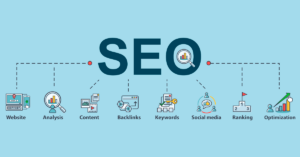7 Best Practices for Organic SEO Success in Your New Business Venture
7 Best Practices for Organic SEO is imperative in starting a new business, but in today’s digital world, success heavily relies on visibility. Without a strong online presence, even the most innovative products or services can struggle to gain traction. That’s where organic SEO (Search Engine Optimization) comes into play. Unlike paid ads, organic SEO focuses on long-term growth by optimizing your website for search engines and users alike.
To help your business rank higher and attract more customers, here are seven essential best practices for organic SEO success.
1. Conduct Thorough Keyword Research
Before creating content, it’s crucial to identify the right keywords your audience is searching for. A strong keyword strategy not only improves search rankings but also ensures that your content aligns with user intent.
To start, use tools like Google Keyword Planner, Ahrefs, or SEMrush to find high-traffic, low-competition keywords. Additionally, prioritize long-tail keywords, as they tend to have less competition and higher conversion rates. Since search intent matters, focusing on informational, navigational, and transactional keywords will make your strategy more effective.
2. Optimize On-Page SEO Elements
Once you’ve identified your target keywords, the next step is optimizing your website’s on-page elements. This includes meta titles, meta descriptions, headers, and image alt text. Moreover, your primary keyword should appear naturally in these elements while maintaining readability.
For best results:
- Use short and compelling meta titles (50-60 characters) that include your target keyword.
- Write engaging meta descriptions (120-160 characters) to improve click-through rates.
- Structure your content using H1, H2, and H3 tags for better readability.
- Optimize images with descriptive file names and alt text.
Not only do these optimizations improve search rankings, but they also enhance user experience and accessibility.
3. 7 Best Practices for Organic SEO : Focus on High-Quality, Valuable Content
Google prioritizes websites that provide high-quality, relevant content. Therefore, content marketing should be a major part of your SEO strategy. Instead of creating generic posts, focus on delivering value to your audience by answering their questions, solving their problems, and providing actionable insights.
To ensure your content performs well:
- Write comprehensive blog posts (1,000+ words) with structured information.
- Use a mix of text, images, videos, and infographics for engagement.
- Incorporate internal and external links to enhance credibility.
- Regularly update older content to keep it relevant and fresh.
When users find your content useful, they are more likely to share it, increasing your website’s authority and search rankings.

4. Improve Website Speed and Mobile-Friendliness
A slow website can negatively impact both user experience and search engine rankings. Additionally, since Google considers page speed a ranking factor, optimizing it should be a priority. Moreover, with the majority of users browsing on mobile devices, ensuring your website is mobile-friendly is equally important.
Moreover, to enhance speed and mobile usability:
- Use tools like Google PageSpeed Insights to identify performance issues.
- Optimize images to reduce loading times.
- Enable browser caching and minify CSS, JavaScript, and HTML.
- Choose a responsive website design that adapts to all screen sizes.
Faster load times lead to lower bounce rates and higher engagement, which ultimately improve your SEO rankings.
5. Strengthen Your Internal Linking Strategy
Internal linking helps distribute page authority and improves navigation, making it easier for both users and search engines to explore your website. Furthermore, a strong internal linking structure enhances content discoverability and keeps visitors engaged longer.
For an effective internal linking strategy:
- Link relevant pages using natural anchor text.
- Prioritize high-authority pages to pass SEO value.
- Avoid excessive links on a single page to maintain clarity.
When done correctly, internal linking strengthens your website’s structure and boosts its overall SEO performance.
6. Build High-Quality Backlinks
Backlinks—links from other websites to yours—are a major ranking factor in Google’s algorithm. However, quality matters more than quantity. A few authoritative backlinks from credible sources are far more valuable than numerous low-quality links.
To earn high-quality backlinks:
- Publish guest posts on reputable industry blogs.
- Create shareable, data-driven content.
- Reach out to influencers and journalists for mentions.
- Leverage broken link building by offering your content as a replacement.
Acquiring strong backlinks boosts your domain authority, which directly impacts your search rankings.
7. Monitor Performance and Adjust Strategies
SEO is an ongoing process, and regular monitoring is necessary to maintain and improve your rankings. Fortunately, tools like Google Analytics, Google Search Console, and Ahrefs provide valuable insights into your website’s performance.
To stay ahead:
- Track keyword rankings and organic traffic.
- Identify pages with high bounce rates and optimize them.
- Monitor backlink growth and disavow toxic links.
- Stay updated with Google algorithm changes and adapt accordingly.
By continuously analyzing and refining your strategies, you can maintain a strong online presence and achieve long-term success.
7 Best Practices for Organic SEO : Additional information found on our home page.
7 Best Practices for Organic SEO: Final Thoughts
Implementing these organic SEO best practices will set your new business venture up for success. Conversely, from keyword research to content creation and technical optimization, every step plays a vital role in improving search rankings and driving organic traffic. While SEO requires patience and consistency, the long-term rewards are well worth the effort.
So, start optimizing today and watch your business grow into a powerful online presence!